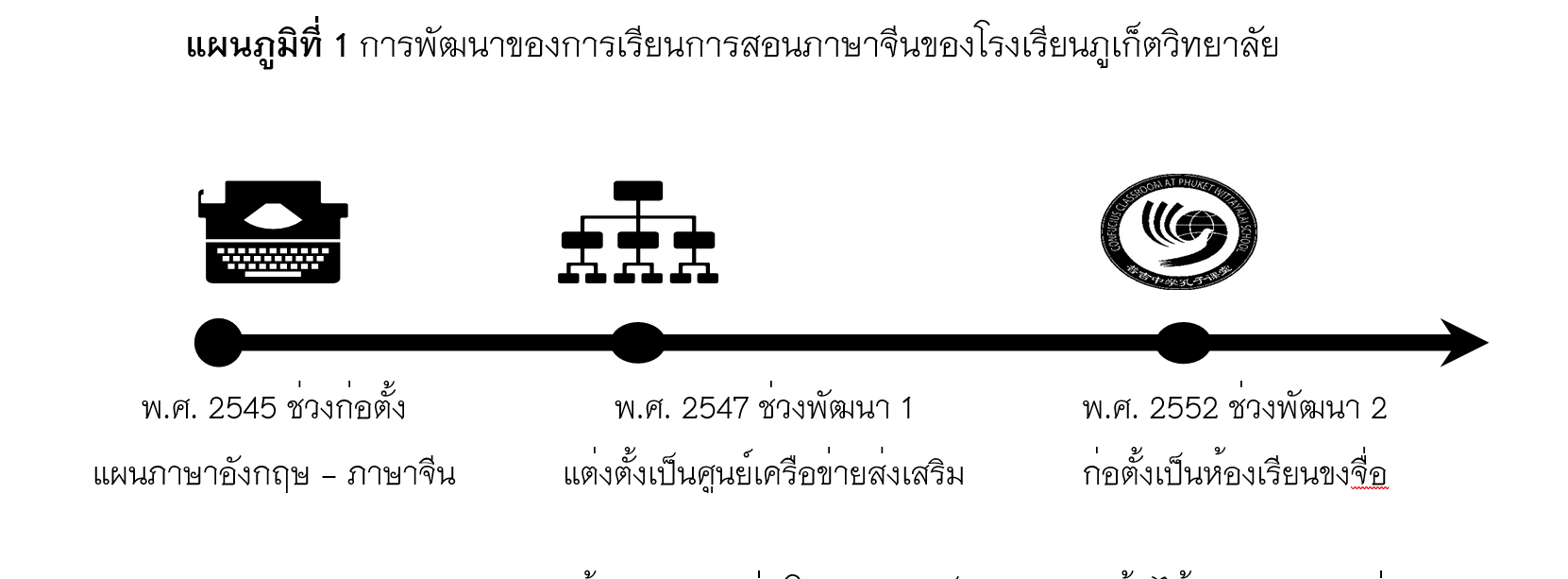Lesson - Learned of Success in Chinese Teaching – Learning of Confucius classroom, Phuket Wittayalai School
Keywords:
Lesson – Learned, Chinese Teaching, Confucius Classroom, Phuket Wittayalai SchoolAbstract
The objectives of this research is to study and analyze all factors in various aspects which resulted effectively to the teaching - learning management of the Confucius Classroom at Phuket Wittayalai school and is accepted widely. The research found that the factors which effect the Chinese teaching - learning at Confucius Classroom, Phuket Wittayalai School is effectively and widely accepted are divided into 3 factors as follows; 1) Internal factors, Confucius Classroom, Phuket Wittayalai School has arranged the obvious and intensive Chinese curriculum, teaching - learning course is up to date and reach the needs of learners, parents and communities, including get the internal strong support into the same direction. 2) External factors, Phuket Wittayalai Confucius Classroom is located on the stronghold, its geographic is on the natural environment surrounded are suitable for the learners to study Chinese. Besides that, many agencies from the public, the private, the association and the federation authority in Phuket also strongly support the Chinese teaching – learning. Lots of opportunities for students to show their full abilities on Chinese and Chinese culture and other special talents, these actions impact the good image of teaching – learning of the Confucius Classroom, Phuket Wittayalai School and are accepted widely. And 3) Others factors as Phuket Wittayalai Confucius Classroom was appointed to be responsible for the Center to Promote Chinese teaching – learning and Confucius Classroom respectively. Confucius Classroom, Phuket Wittayalai School also has various education resources, having cooperative program both within and outside the country as a partnership school resulting the completeness of Chinese teaching - learning at Phuket Wittayalai Confucius Classroom.
References
ไกรสร ฝั้นเฟย และสัมมา รธนิธย์. (2557). การถอดบทเรียนความสําเร็จในการบริหารสถานศึกษาขั้นพื้นฐานโรงเรียนไตรมิตรวิทยาลัย ที่ส่งเสริมการเรียนการสอนภาษาจีน สังกัดสํานักงานเขตพื้นที่การศึกษามัธยมศึกษา เขต 1. วารสารบริหารการศึกษา มหาวิทยาลัยศิลปากร, 5(1), 277-284.
พิชัย แก้วบุตร และอธิปัตย์ นิตย์นรา. (2559). สภาพและแนวทางการพัฒนาการเรียนการสอนภาษาจีนในโรงเรียนรัฐบาล. ใน การประชุมวิชาการระดับชาติ มหาวิทยาลัยราชภัฏภูเก็ต ครั้งที่ 8: 2559 “การวิจัยและพัฒนานวัตกรรมอย่างยั่งยืนสู่โลกาภิวัตน์”, ภูเก็ต: มหาวิทยาลัยราชภัฏภูเก็ต, 70.
พิชัย แก้วบุตร. (2562). นโยบายทางภาษาในการเผยแพร่ภาษาและวัฒนธรรมจีนผ่านการทดสอบวัดระดับภาษาจีน HSK .วารสารวิจัยราชภัฏพระนคร มหาวิทยาลัยราชภัฏพระนคร, 14(2), 307-325.
พิชัย แก้วบุตร. (2563). การศึกษาแนวทางการจัดทำหลักสูตรภาษาจีนระดับมัธยมศึกษาตอนปลายสำหรับการจัดทำหลักสูตรสถานศึกษา ภูมิภาคภาคใต้ (รายงานการวิจัย). มหาวิทยาลัยสงขลานครินทร์ วิทยาเขตสุราษฎร์ธานี, สุราษฎร์ธานี.
พิชัย แก้วบุตร. (2563). ความสนใจของนักศึกษาต่อกิจกรรมเสริมนอกชั้นเรียนวิชาภาษาจีน: กรณีศึกษานักศึกษาวิชาภาษาจีน มหาวิทยาลัยสงขลานครินทร์ วิทยาเขตสุราษฎร์ธานี. วารสารศรีนครินทรวิโรฒวิจัยและพัฒนา (สาขามนุษยศาสตร์และสังคมศาสตร์), 12(23), 27-38.
วิจารณ์ พานิช. (2551). การจัดการความรู้ฉบับนักปฏิบัติ (พิมพ์ครั้งที่ 4). กรุงเทพฯ: สุขภาพใจ.
สำนักงานเลขาธิการสภาการศึกษา. (2559). รายงานการวิจัยเพื่อพัฒนาการเรียนการสอนภาษาจีนในประเทศไทยระดับมัธยมศึกษา. กรุงเทพฯ: บริษัท พริกหวานกราฟฟิค จำกัด.
ห้องเรียนขงจื่อโรงเรียนภูเก็ตวิทยาลัย. (2562). วารสารครบรอบ 10 ปีการก่อตั้งห้องเรียนขงจื่อโรงเรียนภูเก็ตวิทยาลัย. ภูเก็ต: ม.ป.พ.
อรศรี งามวิทยาพงศ์. (2549). กระบวนการเรียนรู้ในสังคมไทยและการเปลี่ยนแปลงจากยุคชุมชนถึงยุคพัฒนาความทันสมัย. กรุงเทพฯ: จุฬาลงกรณ์มหาวิทยาลัย, ศูนย์หนังสือ.

Downloads
Published
How to Cite
Issue
Section
License
ผู้นิพนธ์ต้องรับผิดชอบข้อความในบทนิพนธ์ของตน มหาวิทยาลัยพะเยาไม่จำเป็นต้องเห็นด้วยกับบทความที่ตีพิมพ์เสมอไป ผู้สนใจสามารถคัดลอก และนำไปใช้ได้ แต่จะต้องขออนุมัติเจ้าของ และได้รับการอนุมัติเป็นลายลักษณ์อักษรก่อน พร้อมกับมีการอ้างอิงและกล่าวคำขอบคุณให้ถูกต้องด้วย
The authors are themselves responsible for their contents. Signed articles may not always reflect the opinion of University of Phayao. The articles can be reproduced and reprinted, provided that permission is given by the authors and acknowledgement must be given.







